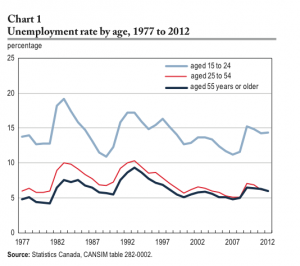This article discusses the recession and how it still effects the 8.7 million people who lost their jobs. As the market is slowly recovering, the jobs available have altered. Instead of the long-term, beneficial, financially stable, full-time jobs, only part-time positions are now available.
The recession helped reconstruct companies and lower employment costs. With the high demand for employment following the huge layoffs, businesses eliminated their full-time positions hired cheaper labour: part-time employees with short hours and a high turnover. With these new employees companies are no longer forced to provide benefits, offer raises, or even pay for lunch breaks. These changes primarily affect those who lost their jobs and are now unable to find full-time positions. They are unable to find wages high enough to support themselves or even their families. Furthermore, companies are neglecting the fact that these changes in employment will also negatively impact them. Part-time, high turnover employees are unmotivated in investing time in the company. They are uninterested in being innovative and solving problems and therefore are not as valuable.
Though hiring part-time workers may be an immediate solution to the recession, it should not be a permanent one. Companies are unaware that workers are important assets. Businesses should see value in hiring well-qualified and driven full-time employees that will contribute to the companies’ success.



